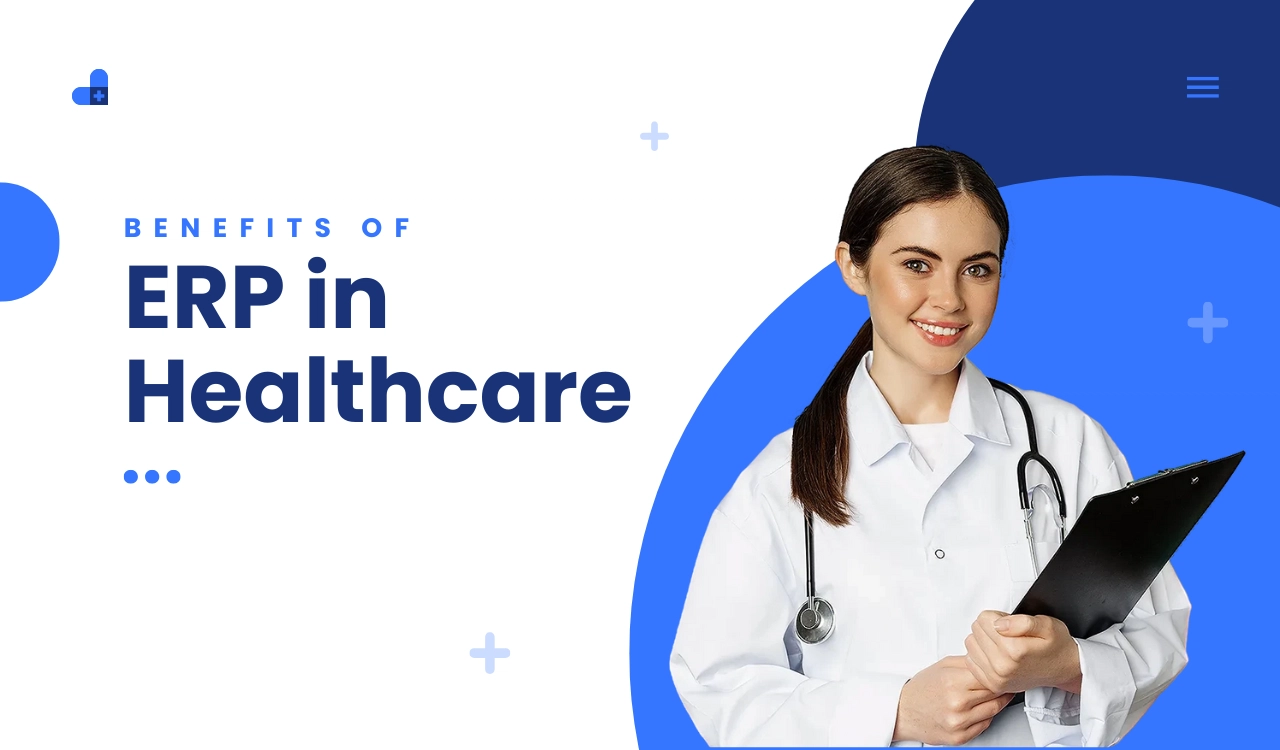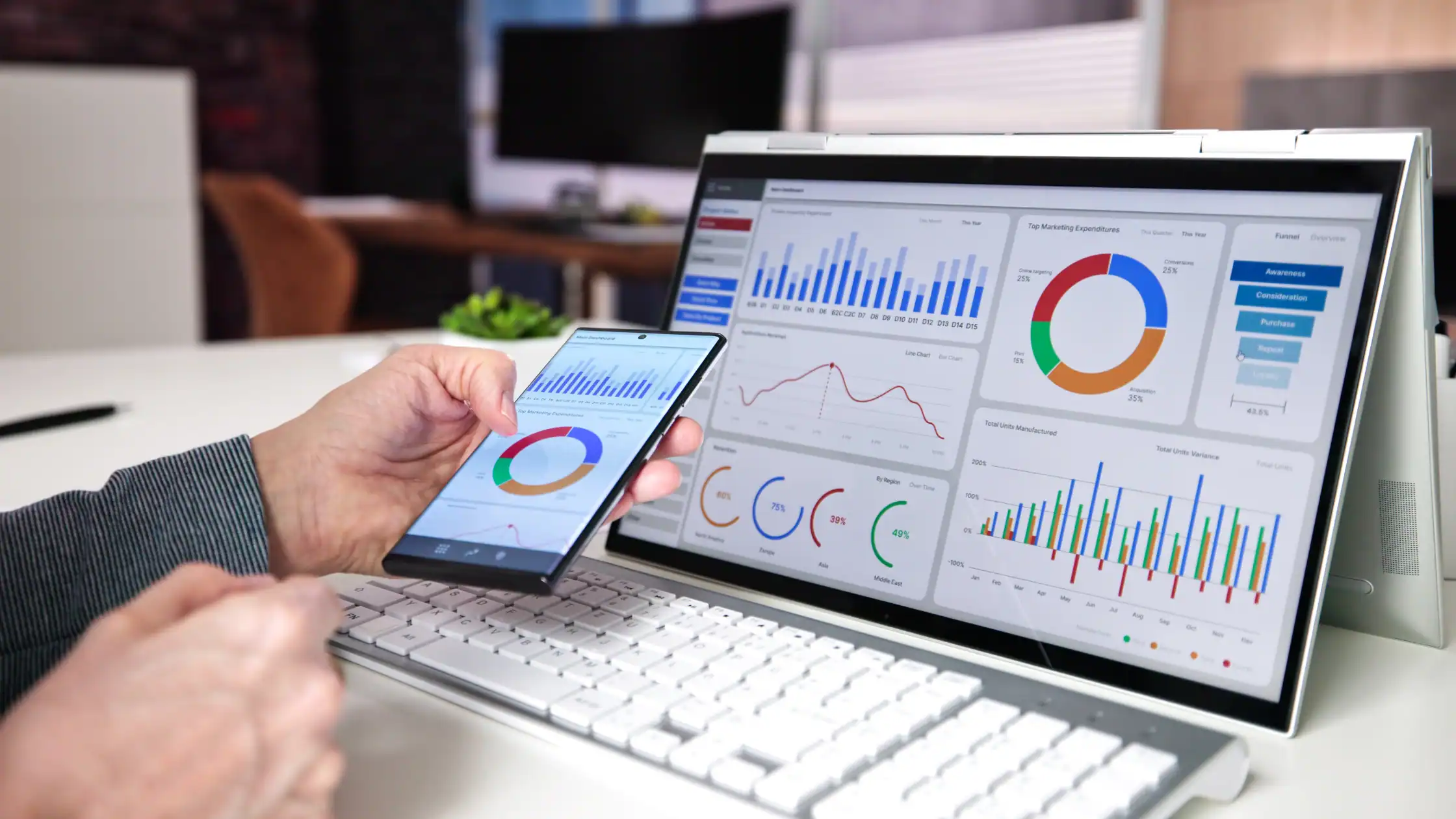
Benefits of ERP in Healthcare for Smarter Hospital Management
The health care system is undergoing rapid changes and is facing increasing pressure to provide high-quality patient treatment during economically stable and operating times at hospitals and clinics. Traditional manual procedures and disconnected software tools are no longer enough to handle the complexity of modern medical systems.
Hospitals today deal with patient management, medical inventory control, invoicing systems, planning of employees, and compliance with regulations at once. Any errors in these areas may be at risk of financial loss, recognized injury, or even the patient’s protection. This is where a healthcare ERP system makes a difference.
In the hospital’s operation, ERP smooths processes, rapid decision-making, and improves the patient’s satisfaction by integrating hospital operations, finance, clinical workflows, and compliance into a single integrated platform.
What is a Healthcare ERP System

An ERP system for the healthcare system exceeds hospital management software – it is an integrated solution that encompasses all aspects of hospital operations on a single platform. Unlike the standalone applications that work in isolation, ERP combines financial management, patient records, and staff planning under a single system.
This integration allows hospitals to streamline workflows, improve communication between departments, and reduce administrative errors. By adding all important operations, ERP strengthens the health professionals to work with greater openness, accuracy, and efficiency, ensuring that the patient’s care is still the highest priority.
Key Components of ERP in Healthcare
ERPs for hospitals usually include many important modules that enhance efficiency and patient results:
- Financial management for accurate invoicing, management cycle management, and cost tracking.
- Human Resource Management is basically to handle staff planning, salary, training, and recruitment.
- Inventory management for real-time tracking of medicines, consumables, and medical equipment.
- Patient information system for the centralization of medical records, laboratory reports, and clinical data for quick decisions.
- Compliance and reporting equipment that ensures NABH, HIPAA, and other regulatory standards.
Why Healthcare Needs ERP More Than Ever
Modern hospitals no longer have simple care facilities; They are complex organizations that should balance clinical skills with economic stability and operational efficiency. Manual systems or outdated software often fails to maintain today with the requirements of today’s health services requirements, which causes holes that affect both employees and patients. This is why an ERP system for the healthcare sector has become inevitable. Below are three main causes for hospitals and clinics to use ERP solutions.
Optimizing Hospital Processes and Patient Services
One of the biggest challenges for hospitals is managing more workflows at the same time. Patient entrance, discharge process, clinical testing, pharmacy management, and invoicing are often handled by various departments, causing delays and errors. An ERP in the health care system brings all these procedures under an umbrella and ensures spontaneous coordination. For example, when a patient is admitted, their items automatically connect with pharmacies, laboratories, and billing departments, reducing duplication and increasing the speed. The result is not only operational efficiency, but also better patient results.
Enhancing Data Accuracy and Compliance with Regulations
Hospitals should follow strict health services rules as privacy laws for patients, clinical standards, and financial reporting requirements. Managing them often causes impurities and punishments. ERP ensures that each transaction, patient records, and financial entries are accurate and safely documented. With functions such as audit paths, data security protocols, and real-time reporting, ERP for the health care system reduces match risk. In addition, hospitals can create reports for inspections, improve transparency, and build up confidence equally between patients and regulators.
Supporting Financial Sustainability and Resource Management
In addition to the care of the patient, hospitals must remain financially durable to continue operations. Mismanaged money, overstay of medical supplies, or poor use of employees often leads to unnecessary costs. ERP systems provide hospitals with detailed financial analysis, budget plans, equipment, and inventory management modules that prevent waste. Real-time data allows administrators to check the control costs and distribute resources effectively. This ensures that hospitals maintain profitability without compromising quality care.
Enhancing Patient Care and Experience Through ERP

Each hospital has patient treatment in the core, and one of the main benefits of ERP in the health care system is the improvement of the quality of the services offered to patients. With all medical and administrative data connected, ERP ensures timely treatment and a seamless experience.
Faster Appointment Scheduling and Reduced Waiting Times
With ERP, patients can order online appointments, while administrators can track the availability of a doctor in real time. This reduces long queues and ensures that patients receive timely attention, especially in emergencies.
Access to Accurate Electronic Medical Records
The ERP store completes the Electronic Medical Journal (EMR) in the same location. This helps doctors arrive at the patient’s history immediately, the diagnosis improves accuracy, and it avoids frequent studies. For patients with chronic diseases, ERP ensures that their treatment registers are always updated and available.
Telemedicine and Remote Consultations with ERP Integration
With the increase in telemedicine, the ERP system is integrated with video consulting platforms, which allows doctors to contact patients externally. This feature is especially beneficial for rural patients who cannot travel long distances for treatment.
Financial Efficiency and Cost Management in Hospitals
The health care system is not just about the best for the patient, but also about financial stability. Hospitals must meet constant pressure to reduce the costs of improving services. An ERP system for health services ensures smart financial management.
Streamlined Billing and Faster Insurance Claims
ERP automatic invoicing processes, integrated with insurance providers and ensure fewer errors in presenting requirements. It reduces rapid reimbursement, improves cash flow, and reduces administrative fees.
Improved Budgeting and Forecasting Capabilities
ERP provides real-time financial insights so that hospital administrators can predict income, expenses, and future investments. This future capacity helps hospitals to be financially stable and ready for development.
Fraud Detection and Financial Transparency
Each transaction in the ERP system is recorded and sound, which reduces the risk of fraud and misrepresentation. Hospitals gain financial transparency, which strengthens confidence in patients and regulatory bodies. In every way, the transaction is recorded and the ERP system is auditable, which reduces the risk of fraud and error. Hospitals gain financial transparency, which strengthens confidence in patients and regulatory bodies.
Operational Benefits of ERP in Healthcare Institutions

Hospitals act as complex ecosystems with several departments that work at the same time. Without proper coordination, misunderstandings and disabilities are common. ERP solves it by adjusting all operational functions.
Human Resource and Staff Scheduling
Management of the hospital staff is a challenge, especially for large multi-specialty hospitals. ERP automates on probation, shift planning, and tracking of attendance, and ensures that the right employees are always available when needed
Inventory and Supply Chain Optimization
ERP tracks the medicine population, surgical supply, and clinical equipment in real time. It increases the notice of low stock, preventing stock delays in treatment. This cost leads to savings and uninterrupted services.
Resource Allocation and Bed Management
Hospital resources such as ICU beds, ventilators, and operating theaters are limited. ERP ensures optimal allocation, reduces conflicts, and, in critical cases, the patient improves the results.
Compliance, Data Security, and Patient Confidentiality
The health care system is one of the most regulated industries. Hospitals should follow strict structures such as NABH and HIPAA that ensure patient data protection.
Meeting NABH, HIPAA, and Global Standards
ERP ensures that hospitals maintain compliance with global and national standards for the healthcare system. Automatic reporting equipment simplifies audit and regulatory checks.
Data Encryption and Access Control
Modern ERP systems use data encryption, multifactor authentication, and role-based access control to ensure the patient’s information. This creates trust between patients and security measures from legal questions.
The Role of Technology and Analytics in Healthcare ERP

ERP is no longer limited to leadership; It is now run by AI, Cloud Computing, and future analysis that prepares hospitals for the future.
AI & ML in ERP
AI helps analyze patient data, predict the outbreak of the disease, and improve the accuracy of the diagnosis. Machine learning algorithms detect patterns that help doctors create more personalized treatment.
Cloud-Based ERP for Multi-Branch Hospitals
For large health services, Cloud ERP ensures even operation in many places. Sky systems are cost-effective, scalable, and accessible anywhere.
Predictive Analytics for Smarter Decisions
The future analysis in ERP predicts the demand for drugs, patient flow, and requirements for staff. This helps hospitals to be ready for the top time as a seasonal disease.
What Happens When Hospitals Operate Without ERP?
Hospitals that use ERP often face fragmented data, delayed patient care, billing errors, and problems with the supply chain. These disabilities not only reduce the patient’s satisfaction but also increase operating costs. Over time, it can damage the hospital’s reputation and development.
Without ERP in the health care system, management struggles to achieve the real-time method of surgery, making the decision slow and reactive. The departments work in silos, causing repetition of work, waste of resources, and poor compliance with health services rules. Ultimately, the lack of integration risks both profitability and patient protection.
How Desun Technology Ensures ERP Success
Desun Technology provides hospital-focused ERP solutions that streamline operations and enhance patient care. Our system includes customized modules such as patient management, pharmacy, pathology, finance, and telemedicine, designed specifically for healthcare workflows. We ensure smooth integration with existing systems, enabling a seamless transition with minimal downtime.
With strict adherence to HIPAA and NABH standards, our ERP guarantees data security and patient privacy. To help hospitals maximize long-term benefits, we also offer staff training, 24/7 technical support, and regular system updates.
Conclusion
ERP in healthcare goes beyond cost savings and efficiency it transforms how hospitals operate. By ensuring compliance, reducing medical errors, and streamlining patient information, ERP strengthens coordination between doctors, nurses, administrators, and financial teams.
This leads to better decision-making, improved patient care, reduced staff stress, and greater transparency for management. Choosing ERP is not just adopting software, but fostering a culture of efficiency, safety, and long-term growth. With Desun Technology as a partner, hospitals gain not only a robust ERP system but also continuous guidance, training, and support to stay future-ready in an evolving healthcare landscape.









